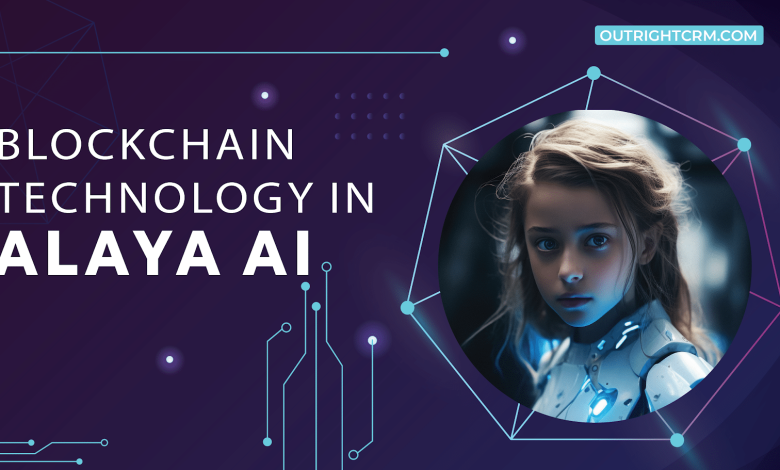Blockchain Technology Alaya AI: The Future of Decentralized Intelligence

In the modern technological landscape. the convergence of blockchain technology and artificial intelligence (AI). is heralding a transformative era. Among the platforms leading this charge is Alaya AI, an innovative system. that fuses the transparency and security of blockchain. with the analytical and predictive prowess of AI. This synergy opens the door to groundbreaking possibilities in data security. decentralized applications, and intelligent automation.
This article delves into the concept of blockchain technology Alaya AI. exploring its core features, benefits, real-world applications, and its potential to revolutionize industries.
Introduction to Blockchain Technology Alaya AI
Blockchain technology has redefined how data managed. stored, and shared, while AI continues to transform how we analyze and act on information. Alaya AI stands at the intersection of these two revolutionary technologies. offering a decentralized ecosystem that combines the best of both.
By embedding AI models within a blockchain framework. Alaya AI ensures secure, tamper-proof, and transparent operations. This unique approach not only addresses many limitations. of traditional systems but also introduces new paradigms for data-driven innovation.
What is Blockchain Technology?
Core Principles of Blockchain
Its defining characteristics include:
- Decentralization: No single authority controls the data.
- Transparency: All transactions are visible to authorized participants.
- Immutability: Data, once recorded, cannot altered without consensus.
- Security: Advanced cryptographic techniques safeguard data.
What Sets Alaya AI Apart?
Alaya AI integrates blockchain’s trust and security features. with AI’s adaptability and intelligence. Here’s what makes it unique:
- Decentralized Intelligence: AI models on Alaya AI operate in a peer-to-peer network. eliminating centralized control.
- Immutable Data for AI Training: Blockchain ensures. that data used for AI training remains unaltered and reliable.
- Smart Contracts: Automates interactions between blockchain and AI, enabling seamless execution of tasks.
- Tokenized Ecosystem: Rewards participants who contribute data. processing power, or AI algorithms to the platform.
Applications of Blockchain Technology Alaya AI
1. Healthcare
The integration of blockchain and AI in Alaya AI. has vast implications for healthcare:
- Secure Patient Data: Blockchain protects sensitive medical records while AI provides actionable insights.
- Personalized Treatment Plans: AI algorithms analyze patient data to recommend tailored treatments.
- Drug Development: Blockchain ensures data transparency, while AI accelerates research.
2. Finance
Blockchain technology Alaya AI is transforming. the financial sector by enhancing efficiency and security:
- Fraud Prevention: AI detects anomalies, and blockchain records transactions .
- Automated Trading: Smart contracts execute trades based on AI predictions.
- Decentralized Lending Platforms: Connect borrowers and lenders without intermediaries.
3. Supply Chain Management
Transparency and efficiency are critical in supply chain operations. and Alaya AI delivers on both fronts:
- Traceability: Blockchain tracks the journey of goods, while AI forecasts demand.
- Quality Assurance: AI ensures product standards, and blockchain verifies compliance.
- Reduced Waste: AI optimizes inventory management to cut waste.
4. Education
Blockchain technology Alaya AI also holds potential in education:
- Credential Verification: Blockchain secures academic records, ensuring authenticity.
- AI-Powered Learning: Personalized education paths based on student performance and preferences.
- Collaborative Research: Researchers share and monetize data on the platform.
Advantages of Blockchain Technology Alaya AI
1. Enhanced Security
Blockchain encrypts and decentralizes data, protecting it from tampering. AI adds an more layer by identifying potential security threats in real time.
2. Transparency and Accountability
Alaya AI ensures every AI decision recorded on the blockchain. making the process auditable and trustworthy.
3. Cost Efficiency
By automating processes and reducing the need for intermediaries. Alaya AI lowers operational costs.
4. Ethical AI Deployment
The immutable nature of blockchain ensures that AI models adhere to ethical guidelines. promoting responsible development and usage.
Challenges and Limitations
1. Scalability
Handling large-scale AI computations on a blockchain can be resource-intensive. leading to delays and higher costs.
2. Energy Consumption
Blockchain networks, especially those using Proof of Work (PoW), consume significant energy. This raises environmental concerns.
3. Regulatory Hurdles
The legal framework for blockchain and AI integration is still evolving. creating uncertainty for developers and businesses.
4. Complexity of Implementation
Building and maintaining a system like Alaya AI requires significant expertise. in both blockchain and AI.
Future Prospects of Blockchain Technology Alaya AI
As blockchain and AI technologies mature, Alaya AI poised to expand. its impact across various domains:
1. Decentralized AI Marketplaces
Alaya AI could support platforms where developers and organizations. share and monetize AI models.
2. AI-Powered Smart Cities
Blockchain and AI could optimize urban infrastructure. managing everything from energy distribution to traffic flow.
3. Global Collaboration
Alaya AI enables secure, cross-border collaboration in fields like research, finance, and healthcare.
4. Integration with IoT
Combining Alaya AI with Internet of Things (IoT) devices could create intelligent ecosystems. that adapt to user needs in real time.
Real-World Example: Alaya AI in Action
To understand the potential of blockchain technology Alaya AI, consider the following scenario:
A pharmaceutical company uses Alaya AI to streamline drug research and distribution:
- Data Security: Blockchain ensures patient data used in research remains private and unaltered.
- AI Insights: Algorithms analyze vast datasets to identify potential drug candidates.
- Smart Contracts: Automates licensing and distribution agreements with minimal manual intervention.
- Transparent Supply Chain: Blockchain tracks. the journey of drugs from the lab to pharmacies.
This integrated approach not only accelerates innovation but also enhances trust among stakeholders.
Conclusion
Blockchain technology Alaya AI represents a paradigm shift in how. we approach data management, security, and intelligence. By combining the strengths of blockchain and AI, Alaya AI offers a decentralized. transparent, and secure platform for innovation across industries.
From healthcare to education, and finance to supply chains. Alaya AI’s applications are vast and impactful. While challenges remain. the future of blockchain technology Alaya AI is bright. offering endless possibilities for creating smarter, more connected systems.
As we embrace this transformative technology. we move closer to a world where decentralized intelligence drives progress. and fosters global collaboration. making blockchain technology Alaya AI a cornerstone of the digital revolution.
FAQS
What is Blockchain Technology in AI?
Blockchain technology in AI refers to the integration of blockchain’s decentralized. and secure data storage system with artificial intelligence’s predictive and analytical capabilities. This combination enhances data integrity. ensures transparency, and allows for the decentralized deployment of AI models. AI benefits from blockchain’s immutable ledger to access trustworthy data. while blockchain gains intelligence from AI for automation and decision-making.
Key Benefits of Blockchain in AI:
- Data Integrity: Blockchain ensures the data AI uses is secure and unaltered.
- Transparency: AI algorithms can audited, enhancing trust in their decision-making.
- Decentralized AI Models: AI operations can run without a central authority, fostering collaboration.
What Technology Used in Blockchain Technology?
Blockchain technology incorporates a variety of components and tools, such as:
- Distributed Ledger Technology (DLT): Stores records across a network of computers.
- Cryptographic Algorithms: Ensures secure transactions and data encryption.
- Consensus Mechanisms: Validates transactions without a central authority. (e.g., Proof of Work, Proof of Stake).
- Smart Contracts: Automates and enforces agreements based on pre-defined rules.
- Hashing Functions: Ensures the immutability of data.
- Peer-to-Peer Networks: Facilitates decentralized communication and transaction validation.
Can AI and Blockchain Used Together?
Yes, AI and blockchain can integrated. creating a powerful combination that benefits from the strengths of each technology. Together, they enhance:
- Data Security: Blockchain’s encryption ensures AI has access to secure. and trustworthy data.
- Process Automation: Smart contracts on blockchain can trigger AI algorithms for automated actions.
- Accountability: Blockchain records AI decisions, making them auditable.
- Decentralized AI Models: Blockchain supports distributed training and deployment of AI.
Applications of AI and Blockchain Integration:
- Healthcare: Secure and analyze patient data for personalized treatments.
- Finance: Detect fraud and manage investments with transparent AI algorithms.
- Supply Chain: Enhance transparency and optimize logistics using AI insights.
What is Blockchain Technology in IoMT?
In the Internet of Medical Things (IoMT). blockchain technology ensures secure, transparent, and interoperable data exchange among connected medical devices. IoMT involves smart healthcare devices. such as wearables, sensors, and diagnostic tools. which generate vast amounts of sensitive data. Blockchain protects this data by:
- Ensuring Security: Encrypting and safeguarding patient information.
- Enhancing Interoperability: Allowing seamless data sharing across different healthcare systems.
- Facilitating Consent Management: Recording patient permissions for data usage on an immutable ledger.
Benefits of Blockchain in IoMT:
- Improved Patient Care: Secure and efficient data sharing enables better diagnoses and treatment.
- Fraud Prevention: Transparent records cut fraud in healthcare billing.
- Decentralized Data Storage: Reduces risks associated with centralized databases.
The integration of blockchain technology in IoMT promises to revolutionize healthcare. by enhancing efficiency, security, and patient empowerment.



